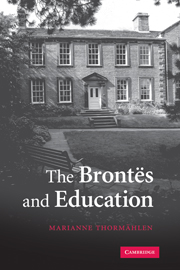V - ORIGINALITY AND FREEDOM
Published online by Cambridge University Press: 22 September 2009
Summary
Introductory Remarks to Section V
To a Brontë reader influenced by the late-twentieth-century ‘ideological turn’ in literary studies, it may seem disappointing to be told that the Brontë sisters did not protest against prevailing notions in the sphere of education. Neither the records of their lives nor their works contain any radical challenges to received educational wisdom. This absence of ‘progressive’ attitudes cannot very well be ascribed to fear of going against public taste. As contemporary reviews show, the sisters' novels offended quite a few readers; and as Charlotte Brontë's correspondence and Anne Brontë's second preface to The Tenant of Wildfell Hall suggest, the authors were unaware that their works might upset some members of the reading public while they were writing and unrepentant when they found out. If they did not express any marked deviations from the ideas and practices of contemporary educationists, it would hence seem likely that it was because there was nothing much in those ideas and practices that they found objectionable.
Disappointment along the lines outlined above is understandable, but there are two sources of comfort. First, as preceding sections have shown, there was much that was laudable in eighteenth- and nineteenth-century educational thinking. Second, there is an element of unbending courage, even audacity, in the Brontës' engagement with education in the wide sense of self-improvement.
- Type
- Chapter
- Information
- The Brontës and Education , pp. 195 - 198Publisher: Cambridge University PressPrint publication year: 2007



